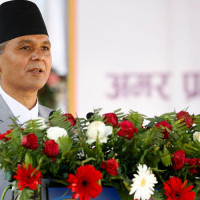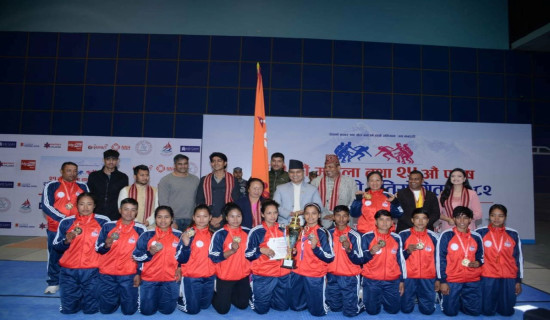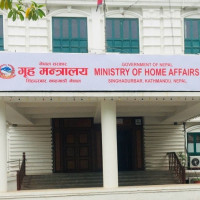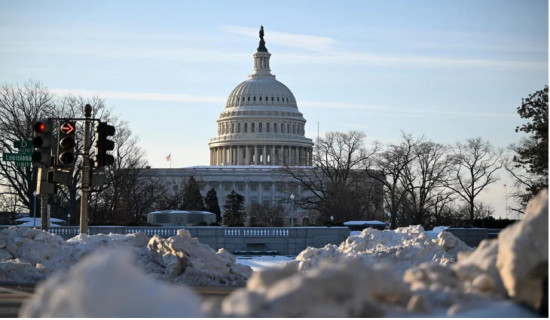- Saturday, 31 January 2026
High inflation hits livelihood of low-income groups
By Laxman Kafle Kathmandu, June 19: Soaring prices of goods and services have been a global phenomenon in recent months, especially after Russia’s disastrous invasion of Ukraine and the counter response of the Western allies against Russia in the form of economic sanctions.
Most of the countries are now facing high rate of inflation triggered by skyrocketing prices of petroleum products. The impact of increased fuel price on the international market has already been felt in Nepali economy too as the inflation rate has already jumped to 7.87 per cent.
Economists have warned that the inflation in the country is likely to be higher because of both internal and external factors in the future, leaving negative and multiplier effects on the import-based economy of Nepal.
Challenging even for advanced countries
Not only for the least developed countries like Nepal, the high inflation has become a big challenge even for the developed countries like the United States of America and the United Kingdom. The Consumer Price Inflation reached beyond 8.6 per cent in America and 9 per cent in the UK in May. It is the highest inflation rate in US after 1981. Retail inflation in India was 7.04 per cent in May.
According to Nepal Rastra Bank (NRB), the y-o-y consumer price inflation stood at 7.87 per cent in the first 10 months (mid-May) of FY 2021/22 compared to 3.65 per cent a year ago.
Economist and former member of National Planning Commission Dr. Chandra Mani Adhikari said that the high inflation derailed sustainable economic growth and development.
"At a time when the world economy was gradually reviving after the COVID-19 pandemic, the Russia-Ukraine war has disturbed the supply chain, resulting in the high prices of food items and petroleum products in the international markets," he said.
The conflict has led to a significant increase in the price of petroleum products and natural gas, which has contributed to the rise in prices of every commodity, as the rise in the price of fossil fuels affects production and transportation costs.
Similarly, the war has reduced supply and sale of natural gas and
production of chemical fertilisers, resulting in the rise of their prices, said Dr. Adhikari. “This will ultimately affect the production of agricultural commodities.”
Russia and Ukraine supply about 30 per cent of the world's wheat, and with the outbreak of war wheat supply has been affected.
Poverty up
When the prices of foods and non-food items increases, life will be affected because people have to spend more for their livelihood, said Dr. Adhikari.
"Income of a citizen does not change even when goods become expensive, and it becomes difficult for everyone to make a living with the same income. In the last few months, the prices of food items, including edible oil, sugar and other commodities have gone up in the market," he said.
The biggest impact of higher inflation will be on the daily wage earners and those having fixed incomes," said Dr. Gunakar Bhatta, executive director of Nepal Rastra Bank (NRB).
He said that rising costs of petroleum products and edible oil due to war would invite multiple challenges to the national economy.
The current inflationary pressures are mainly from food items. Food prices are higher than non-food items worldwide.
In Nepal, the price of edible oil, which is imported from Ukraine, had also started to increase in the domestic market after the import halt of crude oil, along with soybean, palm, sunflower and mustard seeds, due to the rising uncertainty.
The price of edible oil has increased by 10-15 per cent in last four months based on the verities of oil. On average, the price of edible oil has reached around Rs. 310 per litre at present which was Rs. 270 per litre four months ago, traders said.
However, the price of edible oil was about Rs. 170 per litre before the COVID-19 pandemic. The price of sugar has gone up from Rs. 95 per kg to Rs. 110 in the last two weeks.
"Rising prices naturally reduce people's savings and increase investment uncertainty. The poorest and most vulnerable people get most affected by inflation," Dr. Bhatta told The Rising Nepal.
High inflation tends to worsen inequality or poverty because it hits incomes and savings of poor- or middle-income households more than wealthy households. Households that recently escaped from poverty could be pushed back into it because of rising inflation. According to the Multidimensional Poverty Index, Nepal's MPI has dropped to 17.4 per cent in 2021.
Inflation will hit the urban citizens more than villagers as urban residents have to purchase many things for consumption, said Adhikari.
Due to the impact of the rising inflation, it may take few more years for Nepal to achieve the target of sustainable development goals which are supposed to be achieved by 2030.
Basudev Dotel of Kavrepalanchowk, who has been living in Bhaktapur for a decade, said that the rising prices of every commodity had made life of people like him more difficult.
"Prices of daily necessities and petroleum products have skyrocketed, which has hit general life hard. Now it is difficult to manage household expenses with the monthly income from employment," he said.
He said that the rent of house had already increased by 10 per cent showing the increased market price.
He said, "If the prices of commodities continue to rise, the daily life of the workers will be worse.”
The price of petrol, diesel and kerosene has reached an all-time high in the country. Now, petrol costs Rs. 178 per litre and diesel and kerosene Rs. 165 per litre each. The cost of a cylinder of cooking gas has reached Rs. 1,800.
In February 1, 2022, a litre of petrol was Rs. 142, diesel and kerosene Rs. 125 and a cylinder of cooking gas Rs. 1,575 in Nepal.
With the fluctuation, the price of crude oil in the international market reached the highest point ever – USD 133 per barrel on March 8, 2022. The price of crude oil was around Rs. 113 per barrel on Saturday (June 18, 2022). On February 1, the price of crude oil per barrel was USD 89.76.
Slow economic growth
Stating that price rise discourages savings and investment, Dr. Bhatta said that inflation also would have a direct impact on economic growth as consumption, savings and investment are the main sources of economic growth.
"Exports of Nepal are weak and imported commodities are consumed in large quantities and they have become more expensive due to global inflation. Investment becomes more costly and uncertain as the rising prices lead to increase in interest rates," said Dr. Bhatta.
Due to inflation, the cost of the projects will increase and the allocated budget will not be sufficient to complete the projects. The deficiency of budget then leads to delay in project completion which will make harder to achieve the expected growth rate, said Adhikari.
"As the cost of our products increases, the competitiveness of goods which are being exported will also be reduced," he said.
Nepal's GDP is expected to rise by 5.8 per cent in the current fiscal year. The growth projection of 8 per cent in the budget of the upcoming fiscal year will be difficult to achieve if the inflation rises continuously.
The Federation of Contractors’ Association of Nepal (FCAN) has stopped all works except urgent ones showing high price hikes.
The price of iron, which was Rs. 80 per kg before the Russia-Ukraine war, has gone up to Rs. 135 per kg in the local market, said FCAN President Rabi Singh.
However, the price of iron ore has come down to Rs. 110 per kg in the last one week. He said that contractors were unable to run the development projects due to price hikes of construction materials.
Pressure on BoP and forex
Rising price of goods will further intensify external sector instability as the trade deficit of the country will widen further because the country has to spend more to import expensive goods.
"Increased prices in the international market will increase our import bill. As imports become more expensive, they will put further pressure on our foreign exchange reserves and balance of payments," Dr. Bhatta said.
The US dollar is getting stronger against Nepali rupee which is another factor for the diminishing foreign currency reserves and increasing BoP deficit as well.
Nepal Rastra Bank had fixed the exchange rate of one US dollar at Rs 125.22 (selling rate) for Saturday.
Due to the high cost of living across the globe as a result of high inflation, remittances sent by the migrant workers will also be affected.
Tight monetary policy
Former chief of Central Department of Economics, Tribhuvan University, Prof Dr. Ram Prasad Gyanwaly said the government should pay attention to control inflation citing that rising inflation will directly hit the low-income group, fixed-income group and economic growth as well.
"We have no hand to control price hikes caused by external factors. Monetary and fiscal policy are important to curb inflation caused by domestic factors, but even if fiscal policy is enacted, NRB should control inflation by introducing tight monetary policy," he said.
The war between Russia and Ukraine is getting prolonged and it will leave a greater impact on the world economy.
The price in India has also increased significantly, he said, adding that the increase in price in India will contribute to the price rise in Nepal as Nepal's two thirds trade is with India. Stating that the inflation has increased in election year, he said that the inflation might be higher after the upcoming federal and provincial elections.
"Monetary policy focuses on inflation. It cannot be liberal in the current situation. Making monetary policy liberal and flexible means lowering interest rates and increasing credit expansion. In the current scenario, neither interest rates can be reduced nor credit expansion can be increased because the balance of payments deficit is unprecedented," said Dr. Bhatta.








-square-thumb.jpg)








